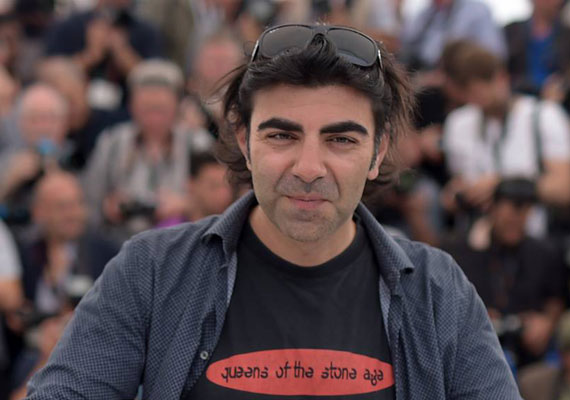Fatih Akin • Director
“As a producer, I protect myself as a director”
- CANNES 2017: We spoke to German director Fatih Akin about his new thriller, In the Fade

A decade after Hamburg-based writer-director-producer Fatih Akin received the Best Screenplay Award for The Edge of Heaven [+see also:
film review
trailer
interview: Fatih Akin
interview: Klaus Maeck
film profile] at the Cannes Film Festival, he returns to the competition withthe thriller In the Fade [+see also:
film review
trailer
interview: Fatih Akin
film profile], starring German actress Diane Kruger. In 2005, he was a Palme d’Or jury member while also presenting Crossing the Bridge [+see also:
trailer
film profile] on the Croisette, and he was on site again in 2012 with his documentary Polluting Paradise [+see also:
trailer
film profile].
Cineuropa: Is In the Fade a revenge-thriller?
Fatih Akin: The film is about a young mother whose life centres on her family, which she adores. She is a full-time mother who loses her husband and child out of the blue, and because she can’t deal with her brokenheartedness, she is looking for justice. But it is also a film about family and justice and how malleable and open to interpretation these terms are. At the same time, In the Fade is a thriller that tries to tell a philosophical story in an entertaining way.
What kind of research did you do?
The film is about a fictional case that is based on the bomb attacks carried out by the National Socialist Underground (NSU), especially the attack in Porz, Cologne, where fortunately people were only injured, not killed. Given the power of the bomb, it was pure luck that nobody died. I read a lot about this case, and a good source for me was the book The NSU Complex by Stefan Aust and Dirk Laabs. Because justice plays a key role in my film, I often attended NSU trials and studied the reports.
Did you have any dramaturgical consultants?
I got Hark Bohm on board, who has studied law and done many court dramas. He is familiar with the formalities and procedures, and knows exactly how to transform them dramatically. Furthermore, Herman Weigel, who worked with Bernd Eichinger for decades, contributed a lot to the dramatic structure of this film, as he also did in the case of Goodbye Berlin [+see also:
trailer
film profile].
How did you get the idea to cast Diane Kruger as the lead actress?
Diane has been living in France for a long time, where all of my films since Head-On [+see also:
trailer
film profile] have been released theatrically. She had mentioned in an interview once that she would like to work with me. I met her at Cannes at my premiere party for Polluting Paradise in 2012. For the main part of In the Fade, I was looking for a character like her, and so I sent her the script. We met and were very quickly on the same page. When I was casting the actors around her, I realised how much pleasure she takes in performing. She is curious, smart and obviously has no fear. It was a very enriching collaboration.
What is it like to work with a big Hollywood star?
I’d never worked with anybody who is so focused on set. That was a huge challenge for me because usually I am the one who is the king of concentration on set. In this case I had to keep up with her. It was an exhausting but also a very positive experience.
How did the co-production with Paris-based Macassar Productions start out?
Mélita Toscan du Plantier is an old friend of mine whom I met when I was with Emir Kusturica at Cannes. After she had finished the first co-production with her company, she told me that she would like to be involved in my next film.
Is it difficult to be a director and a producer at the same time?
I’ve never considered this double function as a burden. It is more the opposite: as a producer, I protect myself as a director, when it comes to artistic freedom. As a director, I can decide to shoot my film chronologically, even if it is more expensive; I don’t need to convince anybody. Furthermore, I can make decisions regarding my team, which is a very good one. My producer, Nurhan Sekerci-Porst, is a skilful and smart woman who ensures that everything is going the way I want it to.
Did you enjoy reading this article? Please subscribe to our newsletter to receive more stories like this directly in your inbox.
















